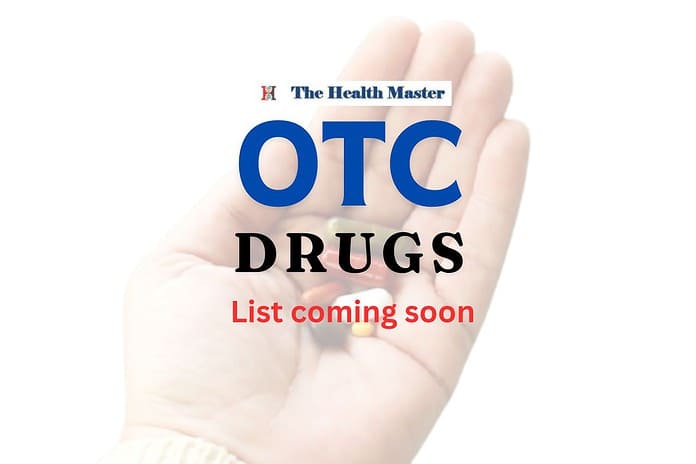Last Updated on January 21, 2025 by The Health Master
OTC
India is poised to revolutionize its pharmaceutical landscape with the imminent release of a comprehensive list of prescription drugs that will soon be available over-the-counter (OTC).
This significant shift, driven by a dedicated sub-committee, aims to improve access to essential medications while ensuring public safety.
The Need for an OTC Framework
Unlike many developed nations like the United States, the United Kingdom, and China, India currently lacks a robust regulatory framework for OTC drugs.
This absence of clear guidelines has led to a concerning situation where:
- Unregulated Distribution: Commonly used medications, including those for cough, cold, and contraception, are already widely available over-the-counter, but their distribution and marketing are largely unregulated.
- Lack of Clear Definitions: The existing Drugs & Cosmetics Act, 1940, and its accompanying rules fail to explicitly define what constitutes an OTC medication.
The Sub-committee’s Mission
To address these critical issues, a sub-committee has been diligently working to:
- Develop a Comprehensive OTC Policy: The committee is meticulously examining international best practices and exploring potential amendments to the Drugs & Cosmetics Act, specifically Schedule K, to incorporate necessary provisions for the safe and effective sale of OTC drugs.
- Prioritize Public Health: The primary focus is to ensure that readily available medications are accessible to the public while simultaneously mitigating the risks of misuse, particularly with regards to antibiotics.
Benefits for the Public
The transition towards a regulated OTC market offers several potential benefits:
- Increased Access to Essential Medications: Patients will have greater access to essential medications, potentially improving healthcare outcomes.
- Reduced Reliance on Prescriptions: For minor ailments, patients may no longer require a doctor’s visit for medications, saving time and resources.
- Improved Patient Safety: By establishing clear guidelines for the sale of OTC drugs, the risk of inappropriate medication use can be significantly reduced.
Addressing Current Concerns
Currently, a significant concern is the potential for inappropriate medication use due to:
- Lack of Qualified Guidance: Many patients rely on pharmacists for medication advice, but pharmacists may not always have the necessary medical expertise to provide appropriate recommendations.
Next Steps
The sub-committee will soon present its findings and recommendations to the Drugs Technical Advisory Board (DTAB), the country’s highest drug advisory body.
This crucial step will pave the way for the implementation of a new regulatory framework for OTC drugs in India.
-
What are OTC drugs?
OTC drugs are medications that can be purchased without a prescription from a doctor.
-
Why is a regulatory framework for OTC drugs important?
A robust framework ensures public safety by:
Regulating the manufacturing and distribution of OTC drugs.
Providing clear guidelines for the sale and use of these medications.
Minimizing the risk of adverse drug reactions. -
What are the potential benefits of increased access to OTC drugs?
Improved access to essential medications.
Reduced reliance on prescriptions for minor ailments.
Potential cost savings for patients.
Disclaimer: This article contains information derived from the source mentioned below. Our team utilized an AI language model to rewrite and present the news or article in a unique format.
Disclaimer: This content, provides generic information only. It is in no way a substitute for a qualified medical opinion. Always consult a specialist or your own doctor for more information. The Health Master does not claim responsibility for this information.
OTC sale of MTP Kits banned: Karnataka
CDSCO Forms Committee to Review OTC Drugs in India
Drug Regulators evaluates list of OTC Medicines
Proposed Sale of OTC Drugs in General Stores Raises Concerns from Chemists
NPPA revised Ceiling price of 13 scheduled formulations: December 2024
Key Notes on Revised Schedule M: Point No. 11 – Personnel
USFDA issued Form 483 with two observations to Aurobindo for API plant
NPPA fixed retail price of 65 formulations: December 2024
Key Notes on Revised Schedule M: Point No. 10 – Self Inspection
Medical Device recall: USFDA classifies recall of these catheters as ‘most serious’
NPPA: New Strategy to Curb Drug Price Hikes
Pharmexcil 2024 Elections: New Leadership for India’s Pharmaceutical Industry
Key Notes on Revised Schedule M: Point No. 9 – Production under Loan License
Drug recall: 1,394 batches of drugs recalled in 2023-24 due to quality issues








